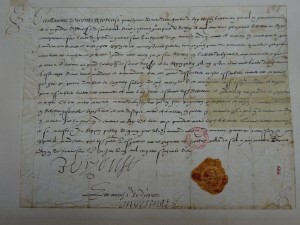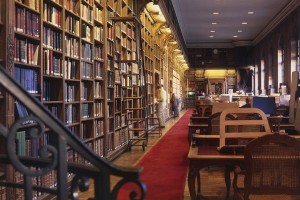Feature Archive : La Bibliothèque Nationale de France (BNF) – site Richelieu-Louvois
Each month, a postgraduate student or an early career researcher shares their experiences of using a particular archive. The overall aim of this section is to create a database of the different archives available to those working on French and Francophone studies that will be of help particularly to students just starting out in research.
David Nicoll (University of Warwick) works on Protestant noble identity during the Wars of Religion in France. Here, he discusses his research at the Richelieu-Louvois site of the Bibliothèque Nationale in Paris.
The Richelieu-Louvois site of the Bibliothèque Nationale de France (BNF), located on Rue de Richelieu in Paris, is an extremely useful research library. Having been based there for the best part of six weeks, I became quite familiar with its inner workings. I was researching a variety of different documents, but particularly royal and noble correspondence, muster rolls, and family papers during in the French Wars of Religion. These sources were mainly located in the Fonds Francais, Cabinet des Titres, and Clairambault series. Any search for royal correspondence in France must start at the BNF, or research on particular nobles in sixteenth-century France. All these documents are in the Département des Manuscrits, on the third floor of the library.
Département des Manuscrits © BnF
Registering for a BNF readers card is a simple enough process, only requiring a letter from your supervisor and a student card. It is important to check the dates the BNF is closed, as France has no shortage of jours fériés. The BNF is open from Monday to Saturday, from 10-6.
Richelieu is very well situated as a site, easier to get to than the BNF site at François-Mitterand, the closest metro stop being Bourse. It is a 5 or 10 minute walk away from the Louvre, which is a nice break from research. There is no café actually in the Richelieu site, although as it is in the centre of Paris, there is no shortage around. If you are bringing your own lunch (which I did most of the time), there is a small park to sit in directly opposite the library entrance.
The archivists are quite helpful, referring you to the archivist specialising on your chosen subject. Instead of struggling with the various idiosyncrasies of the archive, it is much easier to direct all questions to the président de salle, who are generally very knowledgeable and can point you in the right direction. I much preferred working here than at the François Mitterand site, which has no shortage of walking!
The reading room is nice to work in, with working wi-fi and Ethernet. The microfilm readers are also located in this room, but the brightness of the room can sometimes mean it is difficult to read documents (unlike the Archives Nationales site at Pierrefitte-sur-Seine, which is great for reading microfilm).

Arret de Monsieur de Joyeuse, Commandant En Languedoc à Monsieur de St. Vidal pour assembler les troupes de Vélay Contre les Rebelles, June 1562. (Nouvelles acquisitions françaises 23080 f.2, photo David Nicoll)
It is important to note that due to the ongoing renovations at the library, certain documents will take several days to arrive, and all the series affected are listed here (http://www.bnf.fr/documents/com_differee_manuscrits.pdf). You can generally view five manuscripts and five reels of microfilm each day. The microfilm is much quicker to work through as it is not subject to the specified times at which the archivists retrieve the requested manuscripts. If a source is microfilmed or digitised online (as a good number are), you will generally not be able to view the actual physical document, although you can plead your case. Unfortunately, due to the current renovation, there is some secondary literature located on site which is still not available to view, although BNF François Mitterand has everything anyway. Overall it is definitely one of the better archives to work at in Paris.
David Nicoll is in the second year of a PhD studying Protestant noble identity during the Wars of Religion in France at the University of Warwick. He is particularly interested in noble adherence to the Protestant cause, exploring why the nobles chose to join the movement and what this adherence meant in practice
Thank you very much for this, David!



